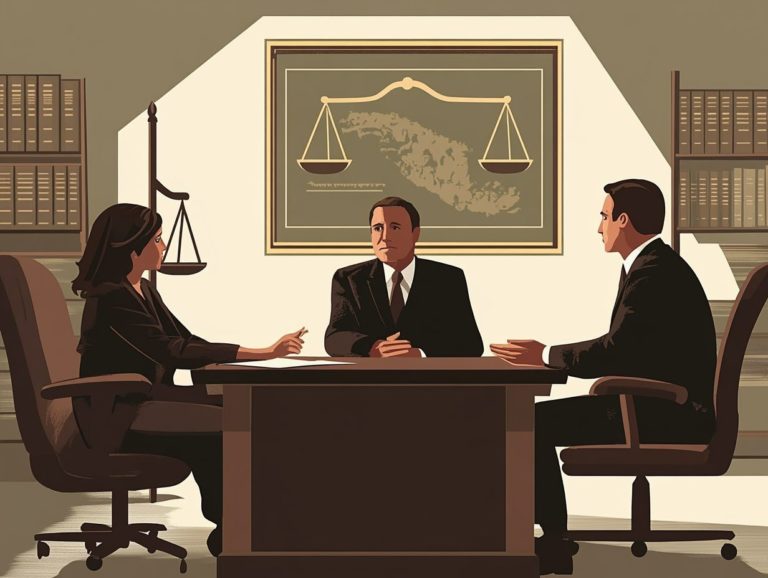5 Questions You Should Ask Potential Defense Attorneys
Choosing the right defense attorney is crucial. Ask the right questions to simplify your decision-making process.
This guide outlines five essential questions that will illuminate an attorney’s experience, strategies, and communication style. By gaining insight into their track record and approach to handling your case, you can make a more informed decision.
Consider important factors such as costs, specialized training, and how they stay updated on legal developments.
Continue reading to ensure that you find the best advocate tailored to your needs.
Contents
- Key Takeaways:
- 1. How Many Years of Experience Do You Have as a Defense Attorney?
- 2. What Types of Cases Have You Handled in the Past?
- 3. How Many Cases Have You Won and Lost?
- 4. What Is Your Strategy for Defending My Case?
- 5. How Do You Communicate with Your Clients?
- What Are the Possible Outcomes of My Case?
- Frequently Asked Questions
- What should I consider when choosing a potential defense attorney?
- How do I know if a potential defense attorney is experienced enough?
- What should I ask about a potential defense attorney’s reputation?
- Is it important to have good communication with my potential defense attorney?
- How can I determine if a potential defense attorney’s fees are reasonable?
- Why is it important to choose a potential defense attorney who is interested in my case?
Key Takeaways:

- Experience matters. Ask about their years as a defense attorney to gauge their expertise.
- Past cases speak volumes. Inquire about the types of cases they have handled to see if they have experience with similar cases.
- Win-loss record is important. Find out their success rate in court to determine their effectiveness as a defense attorney.
1. How Many Years of Experience Do You Have as a Defense Attorney?
In the realm of criminal law, your choice of defense attorney can greatly impact your case’s outcome. An experienced defense lawyer brings invaluable insights and strategies that enhance your chances of success.
With their extensive backgrounds, they handle different criminal charges with confidence stemming from years of practice. They tailor defense strategies that are both adaptable and effective, ensuring your unique situation is addressed with precision.
This wealth of knowledge gives them the power to grasp courtroom procedures, jury dynamics, and the intricate legal precedents that can significantly shift the balance in your favor.
In Stamford and beyond, having a defender with substantial court experience is invaluable. Effective representation relies on their familiarity with the local judicial system and their ability to anticipate prosecution tactics, ultimately leading to more favorable outcomes for individuals facing serious allegations.
2. What Types of Cases Have You Handled in the Past?
A good defense attorney should have experience with various charges like DUI, assault, and drug offenses. This diversity highlights their ability to adeptly navigate the intricacies of the criminal justice system.
Cases can range from minor misdemeanors like petty theft and public intoxication to serious felonies such as armed robbery or homicide. Each situation presents unique challenges, necessitating a meticulous evaluation to determine the most effective defense strategy.
This evaluation process builds trust and confidence in you, the client, assuring you that your legal representation is anchored in a comprehensive understanding of your specific circumstances.
By thoroughly assessing every aspect of your case including evidence, witness statements, and potential plea options the attorney can advocate more effectively for your rights and interests.
3. How Many Cases Have You Won and Lost?
Understanding the number of cases a criminal defense attorney has won and lost provides essential insight into the lawyer’s qualifications and effectiveness.
This evaluation transcends mere statistics; it significantly influences your assessment of a lawyer s ability to navigate complex legal challenges while maintaining a strategic focus.
Each outcome, whether a victory or a loss, reveals the attorney’s trial tactics, negotiation skills, and overall experience in similar cases. Strong communication and trust often lead to better collaboration, enhancing the lawyer’s performance.
By analyzing case records alongside feedback from former clients, you can make informed decisions that align perfectly with your specific legal needs.
Don t leave your future to chance! Keep these questions in mind to ensure you choose the best defense attorney for your needs.
4. What Is Your Strategy for Defending My Case?

A comprehensive defense strategy tailored to your case is essential. This enables your attorney to navigate potential challenges and build a strong argument for you.
Strategies can vary widely and may include:
- Highlighting procedural errors in evidence collection.
- Emphasizing witness credibility.
- Establishing an alibi.
- Presenting expert testimony.
In some situations, these elements can sway the jury’s perception.
Legal advice shapes these strategies. Experienced counsel can pinpoint the best approach for your circumstances.
Effective case management is equally vital. It ensures relevant information is organized, deadlines are met, and the strategy remains coherent. This preparation increases the likelihood of a favorable outcome.
5. How Do You Communicate with Your Clients?
Effective communication is the cornerstone of a strong attorney-client relationship. It keeps you informed and confident throughout the legal process.
Your defense attorney uses various communication methods, including in-person meetings, phone calls, and email updates, to keep you engaged.
Each method has distinct advantages:
- In-person meetings foster a personal connection.
- Phone calls offer immediate interaction.
- Email updates provide quick case developments.
Regular check-ins, regardless of the medium, build trust. They show your concerns are valued and allow for timely strategy adjustments.
What Are the Possible Outcomes of My Case?
Knowing potential outcomes is crucial for your peace of mind and effective planning. The results of a criminal case can vary significantly based on charges, evidence, and your attorney’s effectiveness.
Several scenarios could unfold. Your case might end in dismissal if the evidence is insufficient or improperly obtained. If a jury finds you not guilty, an acquittal may occur.
Plea negotiations allow you to plead guilty for a potentially lighter sentence, which can mitigate harsher penalties.
Your attorney is your strongest ally. They can navigate your case’s complexities and advocate for your best interests.
Thorough consultations are vital. They help you understand your options and make informed decisions throughout the legal proceedings.
What Are the Potential Costs and Fees?
Understanding potential costs and fees of hiring a criminal defense attorney is essential as you navigate your financial obligations. This includes upfront legal fees, retainer agreements, and possible flat fees.
Having a clear grasp of these financial elements empowers you to make informed decisions. Flat fees offer predictability, while hourly rates can vary based on your case’s complexity.
Be aware of additional legal fees, such as court costs or administrative expenses, which can arise unexpectedly. By understanding these fee structures, you can better assess your options and gauge the overall financial commitment.
Do You Have Any Specialized Training or Certifications?

Specialized training and certifications, such as those from the National College of DUI Defense and the National Trial Lawyers Association, enhance your qualifications as a defense attorney. This showcases your commitment to staying current and effective in criminal law.
Investing in such training bolsters your expertise and cultivates trust among clients. When individuals seek legal representation, they prioritize attorneys whose credentials reflect ongoing dedication to professional growth.
These recognitions set you apart in a competitive landscape, distinguishing you from others who may not have pursued advanced training.
Continuously honing your skills elevates your effectiveness in court and empowers your clients. This ensures they receive informed and contemporary defense strategies tailored to their unique situations.
How Do You Handle Conflicts of Interest?
Handling conflicts of interest is a crucial ethical consideration for you as a defense attorney. Maintaining a transparent and trustworthy attorney-client relationship is vital for effective legal representation and client satisfaction.
When you handle these situations, prioritize open dialogue with your clients. Ensure that any potential conflicts are disclosed from the start. For instance, if you previously represented a co-defendant in a related case, evaluate whether that past relationship could compromise your current client’s interests.
In such situations, considering withdrawal from representation is essential to uphold your professional integrity.
Implementing robust conflict-check systems protects you from unintentional breaches, reinforcing your commitment to ethical standards and ensuring your clients feel secure throughout their legal journeys.
What Is Your Availability and Response Time?
An attorney’s availability and response time are crucial elements that shape client relationships. Timely communication ensures clients receive the legal advice and support they need during pivotal moments in their cases.
Clients can expect prompt responses to inquiries, ideally within 24 hours. This quick turnaround establishes a foundation of trust and confidence.
When you prioritize communication, it eases the stress often associated with legal matters and empowers clients to make informed decisions. By keeping an open line of dialogue, you gain a deeper understanding of their needs, leading to a more customized approach to legal strategies.
This synergy cultivates a stronger attorney-client relationship, making clients feel valued and understood throughout their legal journey.
How Do You Stay Up-to-Date with Changes in the Legal System?
Staying current with changes in the legal system is essential for you as an effective defense attorney. Continuous education and awareness of current legal issues ensure that you provide the best representation for your clients.
Many attorneys actively seek opportunities like workshops, seminars, and conferences to learn about the latest developments in laws and regulations.
Subscribing to reputable legal journals allows you to delve into in-depth analyses and case studies that highlight emerging trends.
Joining professional organizations offers networking opportunities and grants access to valuable resources and specialized training.
Your commitment to ongoing education ensures clients receive top-notch representation, as you can adapt your strategies based on the most current and relevant information in the ever-evolving legal landscape.
Frequently Asked Questions

What should I consider when choosing a potential defense attorney?
When choosing a potential defense attorney, consider several important factors. These include their experience, reputation, communication skills, fees, and their level of interest in your case.
If you have further inquiries or need assistance, feel free to reach out for a consultation. We’re here to help!
How do I know if a potential defense attorney is experienced enough?
Ask potential defense attorneys about their experience with cases like yours. Inquire about their success rates and previous case outcomes.
What should I ask about a potential defense attorney’s reputation?
Request references and read client reviews. Check with your local bar association for any disciplinary actions against the attorney.
Is it important to have good communication with my potential defense attorney?
Yes, communication is key in any attorney-client relationship. Ask about their preferred communication methods and how often they’ll update you.
How can I determine if a potential defense attorney’s fees are reasonable?
Discuss fees upfront with the attorney. Get a detailed breakdown of fees and any possible additional costs during your case.
Why is it important to choose a potential defense attorney who is interested in my case?
Choosing an attorney who truly cares about your case ensures they will be invested in achieving the best outcome for you. This can greatly impact the quality of their representation and your case’s success.






